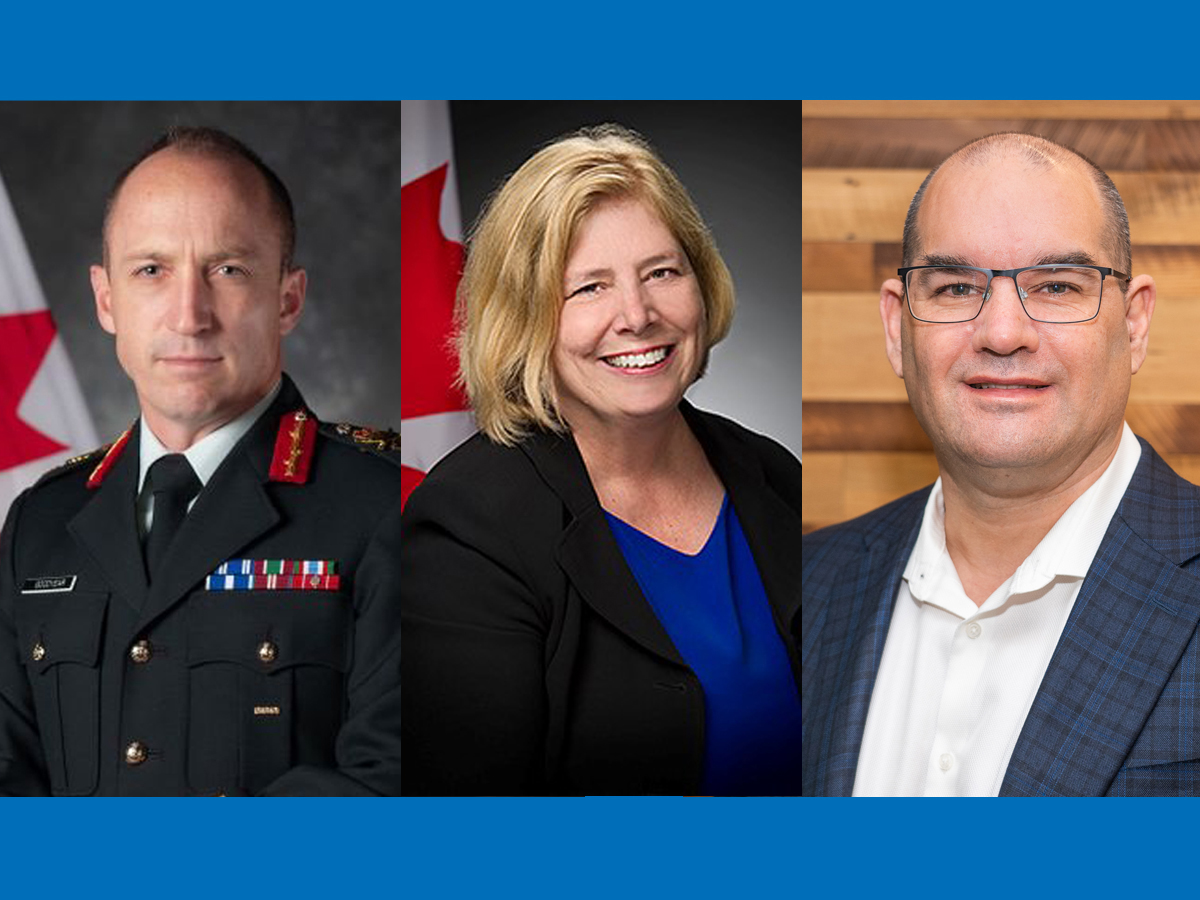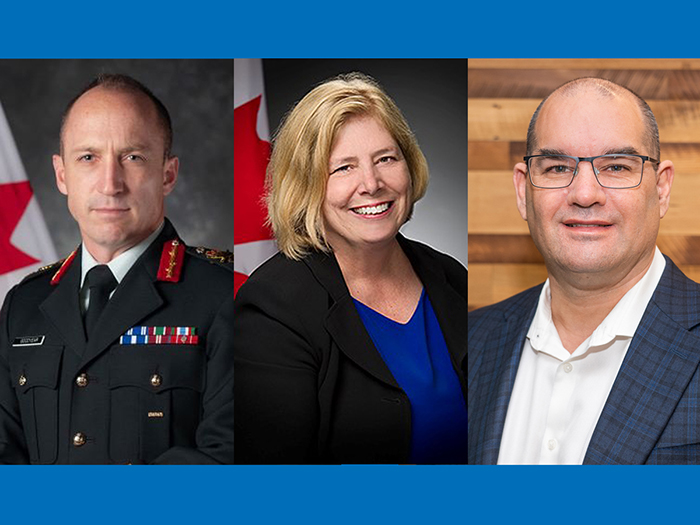
What it’s like to work in the military as a CPA
 From left: Major General Richard Goodyear, Michael Lionais and Cheri Crosby have all used their CPA designation in military roles (Images provided)
From left: Major General Richard Goodyear, Michael Lionais and Cheri Crosby have all used their CPA designation in military roles (Images provided)
When carving out a career as a CPA, a big consideration early on is choosing whether to work in the public or private sectors.
As part of the public sector, enlisting in the Canadian Armed Forces (CAF) as a logistics officer or supporting Canada’s military as an employee of the Department of National Defence (DND) are career pursuits CPAs may not have on their radar.
While the CAF and DND are separate organizations, the two are collectively referred to as Defence and work together to implement government direction regarding the defence of Canada.
Below is a breakdown of what to expect as a CPA enlisting in Canada’s military or joining DND as a civilian employee.
UNDERSTANDING OPPORTUNITIES AND TRAINING
“A CPA in the military is an under-the-radar essential occupation,” says Cheri Crosby, CPA, who is DND’s assistant deputy minister of finance and CFO. In this role, Crosby is responsible for both overseeing the department’s financial management activities and providing advice on military spending.
Within the CAF, CPAs can fill an occupation known as a logistics officer that offers opportunities as both a generalist and specialist. The specialist roles include finance, procurement, supply chain management, transportation and human resource management. These duties may be performed at domestic or international bases that support the army, navy, air force or special forces operations.
There are also roles within special operation units, medical organizations, recruiting offices, reserve units—as well as within DND, the North Atlantic Treaty Organization (NATO), the United Nations (UN) and wherever else Canada has a military presence.
After enrolment in the CAF, training as a logistics officer includes:
- Basic officer training for 12 weeks on general military knowledge, the principles of leadership, regulations and customs of the CAF, basic weapons handling and first aid;
- A rigorous physical fitness program; and
- Applying newly acquired military skills in exercises involving force protection, field training, navigation and leadership.
Those who successfully complete basic officer training attend the Canadian Forces School of Administration and Logistics, where they receive training linked to the branch of the service to which they are assigned (such as the navy, army or air force). Logistics officers may also be offered formal courses to develop specialized skills.
The breadth of experience offered by the military is reflected in the career of Major-General Richard Goodyear who is also a CPA. Currently, DND’s chief financial management and deputy CFO, Goodyear started his career in the CAF as a logistics officer and was deployed to Kosovo and Afghanistan. For his efforts to promote the authority of the Afghan National Bank and helping to increase the foreign use of Afghan currency, he was awarded the Meritorious Service Medal in 2007. He has also commanded CAF bases in Shilo, Manitoba and in Ottawa.
“Having CPAs in uniform is extremely important because the business of Defence has become increasingly complex,” says Goodyear. “Military CPAs combine operational understanding with financial know-how to help navigate this complexity.”
USING AN EXISTING SKILLSET
The professional development CPAs receive when they enlist in the military is also evident in the career of Michael Lionais, CPA, managing director of Technomics Canada. Lionais has more than 35 years of public-sector experience as an officer in the military and then in civilian roles at several federal government departments.
“The military teaches you how to make decisions and provide advice within its particular context,” says Lionais. “Like in the movies, when you’re shining your boots, pressing your uniform and making your bed, they indoctrinate you into a culture and test how you react to stress.”
An accounting designation provides a foundation for what is required to excel as a logistics officer and beyond, adds Lionais, who has occupied many roles in the CAF such as wing accounting officer and base comptroller and, in DND, as executive assistant to the chief financial management-deputy CFO.
“The skills I developed, I continue to apply now,” he says. “It leads to an incredibly complicated and rewarding career.”
A CPA’s ability to problem solve, assess risk and strategize also serves well in a military setting, with a big-picture outlook and anticipating different solutions before acting, according to Lionais. “Financial reporting isn’t the bread and butter of a military officer, decision support is. An accounting professional understands variance analysis, and what differs from the planned versus the actual.”
From a logistics standpoint (a huge aspect of military operations), CPAs can play a key role to ensure that financial resources are available and allocated as needed, says Crosby. “It’s managing the money associated with procurement and logistics, making sure that you have what you need, when and where you need it,” she says. “There is no shortage of challenges when managing resources in an ever-evolving security context.”
PREPARING FOR TWO CULTURES
A first consideration at DND, shares Crosby, is the reality of two distinct cultures with the mix of military members and civilian employees working side by side. Hence, the orientation for civilian employees that may involve travel to CAF bases to experience first-hand the environment and its operations, while further understanding a military mission’s mandate, she adds.
“DND’s civilian employees work hand-in-glove with military members to implement government decisions so, when civilians come to the department, we introduce them to the military life, values and boot camp,” she says. “As an accountant, you don’t just do accounting. Understanding what business you’re in is extremely important at DND because your financial decisions can literally save lives.”
Fiscal management in DND, Crosby explains, is unlike other departments based on the complexity of the budget and the type of inventory. For example, her department forecasts and manages the costs of fighter jets, warships and military operations. “My department has one of the biggest and most complex budgets in addition to billions of dollars of inventory that we must keep track of, replenish and replace. We’ve got the usual pressures, but with much larger cost lines,” she says. “Sound judgment, collaboration and partnership, all of those human elements are extremely important at DND because you can’t do anything alone here.”
With this culture shift, adds Lionais, comes a professional development that prepares you for any next stage of a career, within the public or private sectors. “I wouldn’t be where I am today without the military. The skills I developed, I continue to apply now,” he says. “It leads to an incredibly complicated and rewarding career.”
HARNESS YOUR SKILLS AND CAREER DEVELOPMENT
Considering a career in the public service? Check out the certificate program that’s available on demand, plus be sure to attend CPA Canada’s Public Sector Conference on November 1-2, either in person in Ottawa or virtually, to enhance the role you currently or might want to play as a CPA in public service.